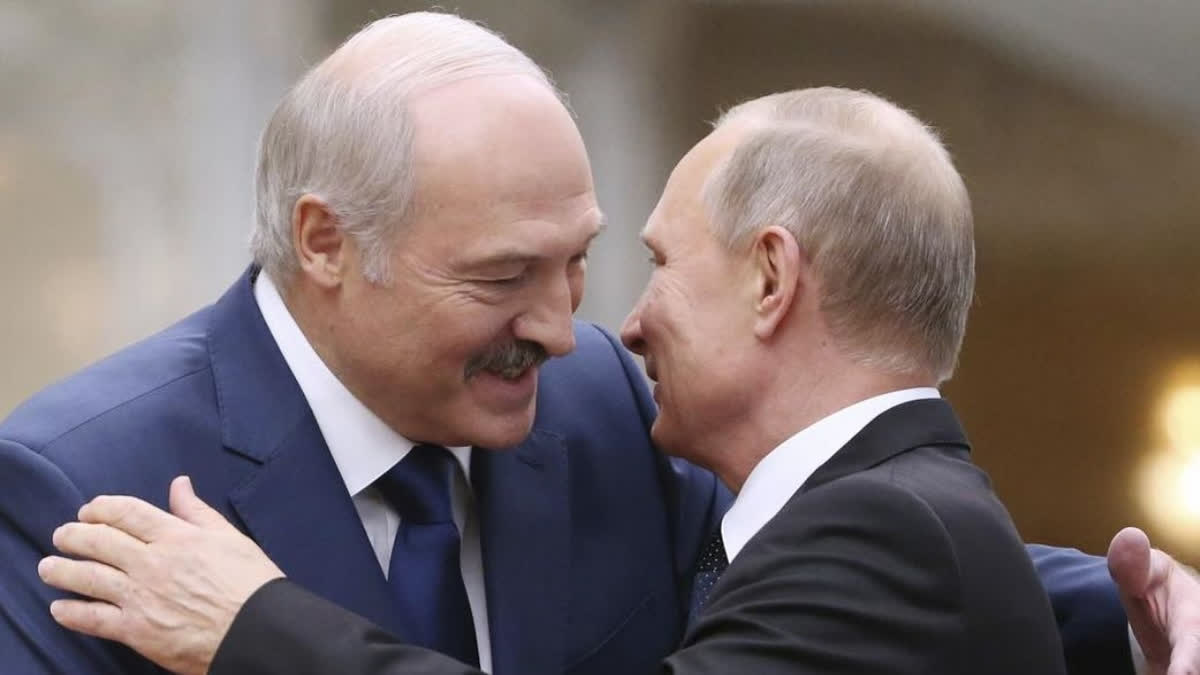New Delhi:After Belarusian President Alexander Lukashenko intervened to stop the Wagner rebellion against Russian President Vladimir Putin last month in the midst of the Ukraine conflict, for many outside the region, there have been speculations as to why Minsk came to the aid of Moscow.
The reason is the Russia-Belarus supranational union state agreement. The origin of the Russia-Belarus Union State dates back to the dissolution of the Soviet Union in 1991. After the collapse of the USSR, both countries became independent nations. However, there were discussions and negotiations about maintaining close ties and fostering integration between the two countries.
In 1999, Lukashenko and then Russian President Boris Yeltsin signed a Treaty on the Creation of a Union State. The pact proposed broad cooperation but stipulated independence for both states. It aimed to establish a supranational entity that would promote political, economic, and military integration between the two countries. It envisioned a unified legal framework, common institutions, and coordination of various policies.
The main driving force behind the Union State was the Russian government, particularly under President Yeltsin and later President Vladimir Putin. The Belarusian leadership, headed by President Lukashenko, also supported the idea of closer integration with Russia.
Over the years, several agreements and protocols have been signed to further define the structure and functions of the Union State.
But, first, what is a supranation?
A supranation, also known as a supranational entity or organisation, refers to a governing body that has authority and decision-making power that transcends the traditional boundaries of nation states. It is an entity that operates above the national level and has the ability to make decisions that are binding on its member states.
Supranational organisations are typically created by multiple sovereign states with the goal of pooling their sovereignty and cooperating on specific issues of common interest. These organisations have their own legal framework, governing institutions, and decision-making processes that member states agree to abide by.
Examples of supranational entities include the European Union (EU), where member states have delegated certain powers to common institutions such as the European Commission and the European Parliament. These institutions have the authority to make decisions that affect member states on issues like trade, regulations, and policies.
But then again, what is a union state?
A union state is a political entity or arrangement where two or more sovereign states come together to form a closer association, usually with the goal of achieving deeper integration and cooperation. A union state typically involves the creation of common institutions, joint decision-making processes, and shared policies in various areas such as politics, economy, defence, and foreign affairs. Note “defence” here in the context of the Russia-Ukraine war.
Coming to the Russia-Ukraine war, the US’s CIA Factbook claims that Belarus facilitated Moscow’s conflict with Kyiv. “After seven decades as a constituent republic of the USSR, Belarus attained its independence in 1991,” the Factbook states. “It has retained closer political and economic ties with Russia than have any of the other former Soviet republics, and since 2022 Belarus has facilitated Russia's war in Ukraine, which was launched in part from Belarusian territory.”
Other countries are also open to joining the Russia-envisioned supranational union state. But this has dangerous implications. On May 28 this year, Lukashenko said that countries which are willing to join the Union State of Russia and Belarus will be given nuclear weapons. But Putin has asserted that Russia would retain tactical control of all nuclear weapons deployed in Belarus. Which is why other nations are chary about joining such an entity.
In fact, the very next day, Kazakhstan President Kassem-Jomart Tokayev rejected Lukashenko’s offer terming it as a joke. “One of these days, the President of the Republic of Belarus Alexander Grigoryevich Lukashenko offered Kazakhstan to join the Union State.” Tokayev said during a visit to the North Kazakhstan region. “I appreciated his joke. I think that there is no need for this since there are other integration associations, first of all, the Eurasian Economic Union.”
In fact, French President Emmanuel Macron went as far as to call Belarus a “vassal state” of Russia. However, at the same time, he said that Europe should go soft on Lukashenko and offer him an “exit strategy”. But the fact of the matter is that Ukraine continues to face two warring nations – Russia to its east and Belarus to its north – because of the supranational union state agreement between Moscow and Minsk.
